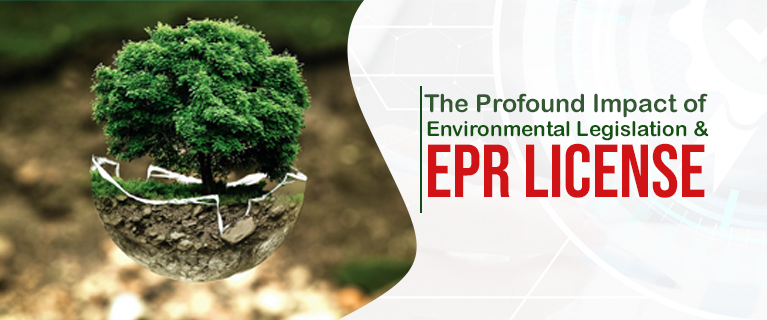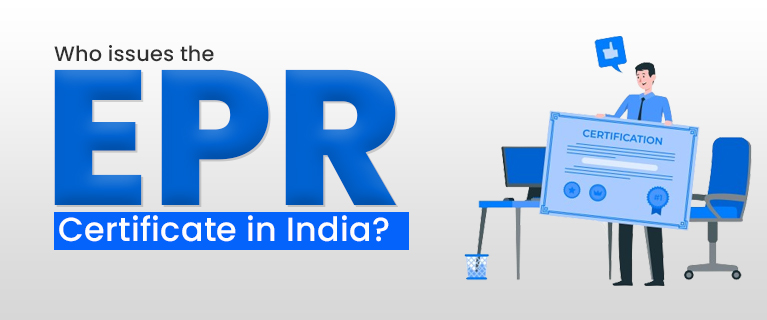The Profound Impact of Environmental Legislation & EPR License
In the relentless global pursuit of a sustainable future, the interplay between environmental legislation and the innovative concept of Extended Producer Responsibility (EPR) licenses emerges as a linchpin, orchestrating a transformative framework for environmental stewardship. As nations worldwide confront the sobering repercussions of climate change and navigate the escalating environmental crisis, the integration of EPR into legislative mechanisms has evolved beyond a mere strategy; it has become a strategic imperative in the battle against ecological degradation.
Against the backdrop of a planet in flux, this blog embarks on a comprehensive exploration of the symbiotic relationship between environmental legislation and EPR licenses, unravelling the profound impact this dynamic duo has on shaping responsible and sustainable practices across diverse industries.
In an era where the consequences of human activity on the environment are increasingly evident, nations find themselves at a crossroads. The urgency to mitigate environmental degradation and chart a course toward sustainable development has given rise to a new paradigm. The marriage of environmental legislation with the innovative approach of EPR licenses stands as a beacon of hope, signalling a departure from traditional norms towards a more conscientious and holistic environmental management strategy.
Read Also This – Guide To Getting EPR Certification Online
The concept of EPR license introduces a fundamental shift in accountability, placing the onus on producers to manage the entire life cycle of their products responsibly. This paradigmatic change aligns with the broader goals of environmental legislation, which seeks to regulate and guide industries toward practices that are ecologically responsible and ethically sound.
As the repercussions of climate change become increasingly dire, the synergy between legislative frameworks and EPR licenses acquires newfound significance. It is not merely a reactive response to environmental challenges but a proactive strategy aimed at reshaping industries and fostering a culture of sustainability. This investigation attempts to peel back the layers of this dynamic interaction and show how the key to a more robust and sustainable future for our planet lies in the convergence of corporate accountability and governmental actions, as represented by EPR licenses. Join us on this journey as we delve into the intricate tapestry of environmental legislation and EPR licenses, uncovering the promise they hold for a world in need of transformative solutions.
Understanding EPR as a Paradigm Shift in Accountability:
Extended Producer Responsibility, as a concept, represents a fundamental shift in how we perceive accountability for environmental impact. Traditionally, the burden of managing waste and minimizing ecological footprint has rested on governments and local municipalities. EPR License flips this narrative by placing the onus on producers, requiring them to take responsibility for the entire life cycle of their products.
Environmental Legislation as a Catalyst:
The integration of EPR into environmental legislation amplifies its impact. Countries around the world are recognizing the urgency of enacting laws that not only promote sustainable practices but also enforce them. These legislations outline the responsibilities of producers, delineating clear guidelines for waste management, recycling, and reducing environmental impact. The legislative framework provides the teeth needed to ensure compliance and accountability.
The EPR License as a Gateway to Responsible Production:
The EPR license serves as the gateway for businesses to operate responsibly in the environmental landscape. Obtaining this license signifies a commitment from producers to manage their products from cradle to grave, fostering a circular economy. It involves implementing strategies for waste reduction, recycling, and ensuring environmentally friendly disposal methods.
Advantages for Producers:
While compliance with environmental legislation and securing an EPR license might seem like added complexities for producers, the benefits far outweigh the challenges. Producers gain a competitive edge by aligning with consumer preferences for eco-friendly products. Moreover, the potential for cost savings through efficient resource use and recycling processes makes EPR a strategic business move.
Read Also This – Is It Obligatory To Seek EPR Certification In India
The Holistic Impact:
The amalgamation of environmental legislation with EPR licenses results in a holistic approach to sustainability. By incentivizing responsible production and penalizing non-compliance, this framework creates a ripple effect across industries. It encourages innovation in eco-friendly product design, promotes the adoption of renewable resources, and fosters a culture of corporate responsibility.
Global Perspectives and Collaborative Solutions:
The beauty of the EPR license lies in its adaptability to diverse industries and global contexts. Countries worldwide are adopting or adapting EPR frameworks to suit their unique environmental challenges. This global collaboration not only acknowledges the interconnectedness of environmental issues but also paves the way for shared solutions and best practices.
In conclusion, the marriage of environmental legislation and the EPR license represents a beacon of hope in the quest for a sustainable future. It is a collective call to action for producers, governments, and consumers to participate in a transformative journey towards responsible and conscientious practices. As industries evolve, embracing the symbiotic relationship between legislation and EPR licenses is not just a legal obligation but a strategic imperative for a planet in dire In the culmination of this exploration into the intersection of environmental legislation and the transformative paradigm of Extended Producer Responsibility (EPR) licenses, it becomes increasingly evident that this marriage is not merely a legal framework but a beacon of hope in our collective quest for a sustainable future. It resonates as a powerful call to action, uniting producers, governments, and consumers in a transformative journey toward responsible and conscientious practices that are paramount in mitigating the environmental challenges facing our planet.
At its core, the symbiotic relationship between environmental legislation and EPR licenses serves as a rallying point for a global shift towards sustainability. It is a call to arms for producers, urging them to reconsider the life cycle of their products and embrace eco-friendly practices. Governments, as custodians of the public welfare, are prompted to craft and enforce robust environmental legislation that not only regulates industries but actively encourages them to adopt sustainable practices through the EPR framework.
Producers find themselves at the nexus of this transformative journey, recognizing that the EPR license is not just a compliance requirement but a strategic imperative for survival in an era where consumers increasingly value sustainability. Beyond being a legal obligation, obtaining an EPR license becomes a mark of corporate responsibility, signalling to consumers that a company is committed to minimizing its environmental footprint and contributing to a healthier planet.
Governments play a crucial role as orchestrators of change, enacting environmental legislation that provides the regulatory framework necessary for EPR to flourish. Incentivizing sustainable practices through legislation ensures that businesses align their goals with broader environmental objectives. The EPR license, within this legislative context, becomes a tool for accountability, encouraging proactive participation in environmental conservation.
Consumers, armed with a growing awareness of environmental issues, are pivotal agents in this collective journey. They wield significant influence through their purchasing choices, demanding eco-friendly products and supporting companies that demonstrate environmental responsibility. The synergy between legislation and EPR license empowers consumers by offering transparency and assurance that the products they choose align with sustainability goals.
Read Also This – How To Register EPR Online And Who Is Required To Do The Registration
As industries evolve in response to this shifting landscape, the marriage of environmental legislation and EPR licenses emerges not just as a legal obligation but as a strategic imperative. It becomes a catalyst for innovation, inspiring businesses to develop sustainable practices, redesign products with circularity in mind, and invest in technologies that reduce environmental impact.
In essence, the fusion of environmental legislation and the EPR license represents more than a set of rules and regulations; it signifies a global commitment to environmental stewardship. It is a beacon of hope that illuminates the path towards a sustainable future, where industries thrive in harmony with the environment, and each stakeholder—producers, governments, and consumers—plays a vital role in this transformative and conscientious journey toward a planet that thrives for generations to come.










